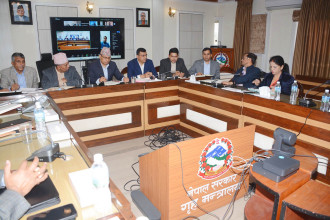-1751868528.jpeg)
KATHMANDU: Nepal Rastra Bank (NRB) Governor Dr Biswo Nath Poudel said the upcoming monetary policy will support fiscal policy programmes and focus on agriculture, energy and industry, while addressing rising non-performing loans (NPLs).
Speaking at a 'Pre-Monetary Policy' discussion organised by the Society of Economic Journalists-Nepal (SEJON), NRB Governor Poudel confirmed the policy will prioritise agriculture, energy and industry while tackling rising non-performing loans (NPLs). “Despite our efforts, NPLs remain high in agriculture and industry. We will promote small businesses and leave no sector behind,” he said.
-1751868529.jpeg)
-1751868529.jpeg)
Addressing the programme, Nepal Bankers’ Association President Santosh Koirala urged the formation of an asset management company to tackle growing bad loans and stalled real estate collateral. He warned that banks face a cash-flow, not a collateral, crisis: “Goods are not selling, so loans cannot be repaid.” He also called for a review of credit limits in priority sectors.
Likewise, Confederation of Banks and Financial Institutions Nepal (CBFIN) President Upendra Prasad Poudel said aggressive lending to meet central bank targets has strained recoveries. “We must analyse why NPLs are rising and boost borrowers’ capacity to repay,” he said, urging a separate study of directed-lending policies.
'Monetary policy needed to revitalise economy'
-1751868528.jpeg)
Stakeholders stated that the monetary policy should be prepared in a way that revitalises the challenging economy.
They suggested that since NPLs have increased challenges, the forthcoming policy should seek alternatives to resolve this. Participants in the panel session of SEJON’s ‘Pre-Monetary Discussion’ programme made this point.
CBFIN Senior Vice President Rajesh Upadhyay criticised strict loan-loss provisions that deter collateral sales, while economist Dr Menuka Karki recommended assessing how private-sector loans contribute to productivity and employment. She noted banks once carried 12 %–13 % bad loans and benefitted from past restructuring facilities.
Former chief secretary Dr Baikuntha Aryal argued that monetary policy should complement fiscal policy rather than operate in isolation, warning that unstable policies force the private sector to pin higher hopes on central bank measures.
Economist Dr Sameer Khatiwada countered that central bank autonomy and a primary focus on inflation control are standard international practice. “Fiscal policy must create the environment; monetary policy needs freedom to operate,” he said.





-1772617959.jpeg)
